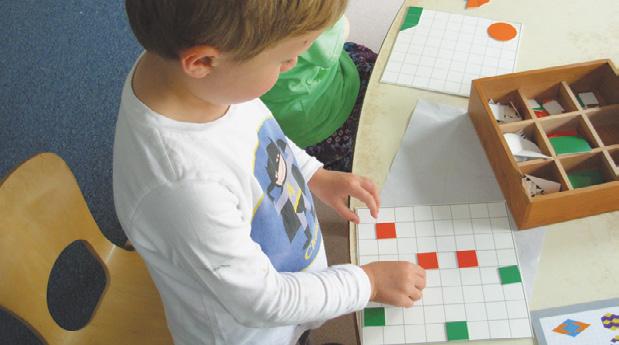
5 minute read
Is Your Child Ready for Kindergarten?
Important (and often overlooked) skills to teach at home
Kindergarten is an important milestone in a child’s life and as parents, we want kids to be prepared. “Kindergarten is [often] the first time children are given an opportunity to be independent,” says Michaela Schuzer, a kindergarten teacher. “Kindergarten focuses on letters and letter sounds, but also on concepts like sharing and how to behave at school.”
A study from JAMA Pediatrics in February 2024 shows a worsening of kindergarten readiness during the COVID-19 pandemic, which we are still recovering from. Kindergarten teacher Paula Johnson agrees. “Many, but not all, of those students were lacking in readiness skills due to not attending a preschool program from March 2020 and beyond,” Johnson says. “Some may have been academically prepared, but many were not ready socially or emotionally and lacked self-care skills.”
The key to success is to encourage independence by teaching children basic life skills. “We often don’t think we need to teach basic life skills because [they are] second nature to us,” says Schuzer. Supporting your child’s learning at home will have a far-reaching impact.
Schuzer and Johnson recommend practicing these skills before children start kindergarten—and to continue working on them throughout the year.
Books to Get Kids Excited for Kindergarten
• On the First Day of Kindergarten by Tish Rabe
• How to Be Confident in Kindergarten by D.J. Steinberg
• Clifford Goes to Kindergarten by Norman Bridwell
• The 12 Days of Kindergarten by Jenna Lettice
• I’m Going to Crush Kindergarten by Sonica Ellis
• Butterflies on the First Day of School by Annie Silvestro
• KINDergarten: Where Kindness Matters Every Day by Vera Ahiyya
Self-Help Skills
Typical children ages 5–6 years are perfectly capable of basic personal care needed for school. Children entering kindergarten should know how to blow their noses, button their pants, fix jackets that have been turned inside-out, open snack packages and containers, and wipe their bottoms.
“When parents do not allow time to build these skills, children are already at a disadvantage compared to their peers,” says Johnson. “Shoe tying is developmental and may not happen until later in the school year.” Until then, select shoes that kids can put on independently.
If it appears your child is not capable of learning self-help or social skills at this age, schedule an appointment with your family’s pediatrician.
Teaching Moments
Everyday activities can be turned into kindergarten teaching moments. Schuzer suggests dinner prep as a perfect opportunity. “Ask about the colors of food you are preparing, what letter the color words start with and the sounds they make,” she says. Use setting and clearing the table as a chance to practice responsibility.
Play age-appropriate games at home to practice skills like taking turns, winning and losing gracefully, problem solving and strategic thinking.
Reading
The importance of reading cannot be overstated. “Reading aloud is so beneficial for [young children], especially as we identify new letters and sounds,” says Schuzer.
Johnson adds that parents should also be “caught” reading. “Children need to see adults reading books, magazines or newspapers versus only seeing them scroll on devices (even if you are technically reading).”
Social Skills
Social skills are important life skills that children will continue to develop as they grow, but it starts now. Give kids opportunities to speak to adults when ordering meals at a restaurant or checking out books at the library. Talk about respectfulness of people’s feelings and possessions, and how to include children (who may be less adept at joining in) in playtime.
Responsibility
Don’t empty your child’s backpack at home. Teach children to remove papers from their folder every day and place them in the same designated spot. Teach them to put lunch boxes in the kitchen or containers in the sink. “Children are capable of following rules and routines at school, so it shouldn’t be any different at home,” says Johnson. It is also a child’s responsibility to make sure everything is in their backpacks before they leave in the morning. “My least favorite statement from students is ‘My mom forgot to put it in my backpack,’” says Johnson.
Self Soothe
Self-soothing (or self-calming) is a critical skill that builds emotional resilience at any age, but it’s particularly helpful for children in a room of 20 kindergarteners. By the age of 5, typical kids should be able to avoid tantrums when they are frustrated. “Big feelings are OK, but not if that transfers to hurting others or impeding others from learning,” says Johnson.
Schuzer has a feelings chart that her students complete each morning. “Students start the day by moving their assigned number to the color that matches their mood.” Schuzer includes coping buckets near the chart that are based on mood color. Each contains appropriate snacks, stuffed animals and fidget toys. “Throughout the day, students can visit the feelings chart area for five minutes before returning to work,” she says. “We all need a break sometimes and this area offers just that!” v





